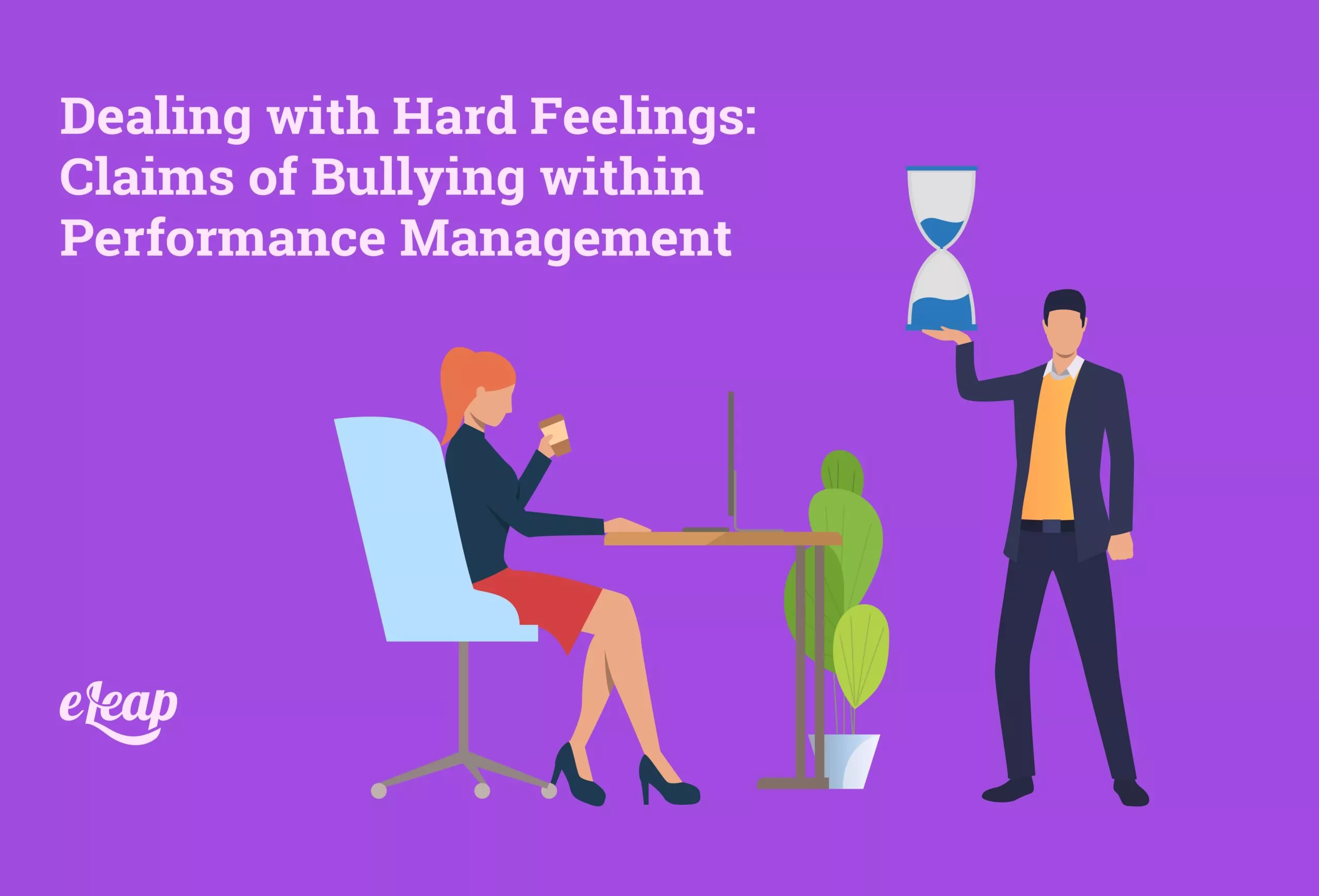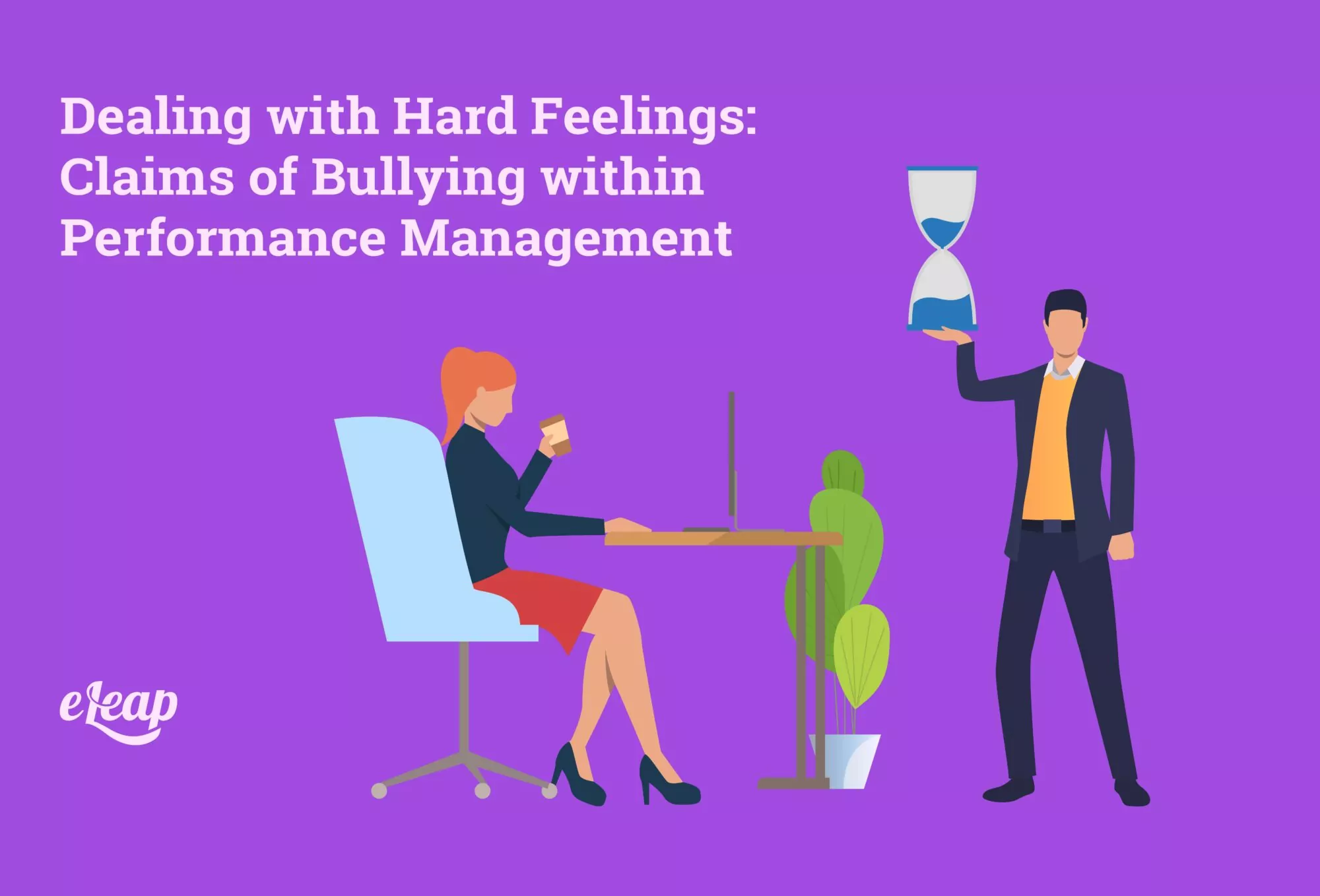Dealing with Hard Feelings: Claims of Bullying within Performance Management

Performance management is a critical component of running a successful business. It’s the flip side of learning and development and it involves managers working directly with employees to fine-tune their performance, overcome problem behaviors, and do their best work.
However, it can also create hard feelings. In some cases, it can even lead to claims of bullying behavior. While bullying has no place in today’s organizations, not all such claims are justified. For managers, it is important to understand several key elements in these situations.

What Does Bullying Look Like within Performance Management?
We’re all familiar with the age-old image of bullying, particularly on the playground and in the classroom. However, it does occur in the workplace, where it can take the form of targeting someone with practical jokes, misleading people about work responsibilities, or even threatening or humiliating people.
What does it look like in performance management, specifically, though? Here, it can take several different forms, such as:
- Excessive performance monitoring
- Overly harsh/critical criticism
- Threatening employees if they do not improve their performance
- Attacking the person rather than the behavior/outcome
- Shouting at or belittling the employee
- Holding some employees accountable for specific actions but no other employees
Most of those seem like “dead giveaways” and are actions that any self-respecting manager would consciously avoid. However, that does not stop complaints from happening. Let’s look at an example of what might happen.
You’re a manager responsible for helping an employee improve his performance. You’re concerned about several times when the employee showed poor judgment. You are also concerned about the employee’s challenges in meeting deadlines.
To help the employee improve, you put a performance management process in place. However, it is unsuccessful and the employee’s performance has not improved, so now you’re considering termination. As you begin to wrap up the performance management process, you set up a meeting with the employee to discuss the situation, including their continued employment. However, before that can take place, the employee takes sick leave and claims that the reason for their ill health is stress over your bullying tactics.
What do you do at this point? You have a few options. One is to take adverse action and terminate the employee, but that might leave the organization open to legal action.
Another is to simply let things ride and decide what to do when the employee returns to work. However, before their leave is over, you receive two things: the first is a medical order that tells you the employee is unfit for work. The second is a notice from the employee’s attorney notifying you that the employee is taking legal action due to bullying in the workplace.
Eventually, the employee’s legal action is denied. An internal investigation also finds no wrongdoing on your part, which means there wasn’t any bullying. How did the employee come to believe that there was, though?
The truth is that performance management can feel like bullying because of the uncomfortable emotions that it engenders. In some cases, employees may genuinely feel that they are being bullied while being performance managed because they do not understand what must occur for something to be considered “bullying”.
What Is Considered Bullying in Performance Management?
For something to constitute bullying in the workplace, the behavior needs to be:
- Repeated
- Unreasonable
This means that occasional negative incidents and low-level conflict generally don’t qualify. “Repeated” means that a behavior takes place several times over a specific period. That’s easy enough to understand. However, what does “unreasonable behavior” mean?
You’ll find that the actions we discussed earlier fall into this category. However, others might not come to mind at first. These include the following:
- Focusing on things that cannot be changed
- Vague comments that lack focus and specificity
- Exaggerated comments and overgeneralization
- Speaking of impacts, not actions
- Drawing unfounded conclusions/jumping to conclusions without sufficient data
- Creating the feeling that an employee is being gossiped about
While none of these things sounds like “bullying” in its classic sense, when they occur repeatedly, they create a negative work environment and are considered unreasonable behaviors. So, what is considered reasonable, though?
Reasonable behavior is anything related to performance managing employees that fits the cause and circumstances, as well as any results that occurred. For instance, you can comfortably schedule regular meetings to discuss ongoing performance issues. You can also discipline an employee for identified misconduct, undertake investigations into complaints, and modify an employee’s responsibilities as necessary to meet health limitations or performance constraints.
Avoiding Complaints of Bullying with Best Practices
While there is no way to change an employee’s honest perceptions, it is possible to help protect yourself and the organization against charges of bullying by following some specific best practices when it comes to performance management. These include the following:
- Document every one-on-one and check-in, including any underlying reason for it.
- Make sure that the employee acknowledges any official coaching (with a signature).
- Ensure that the employee is clear on their role and responsibilities, as well as what is expected of them at all times.
- Ask how you can help them overcome challenges that may be causing the problem behavior, such as setting flexible hours.
- Create and implement clear standards based on key performance indicators.
- Implement policies that discuss unacceptable behaviors and explain the consequences of those behaviors.
- Provide formal warnings that connect to policies and KPIs, and always document employee behaviors that breach those policies.
- All performance management meetings should be documented.
Ultimately, avoiding the appearance of bullying may be difficult. Employees may genuinely feel that they are being targeted unfairly. However, if you follow the steps outlined above and can show that your behavior is both reasonable and warranted, claims of bullying will usually be dismissed.
With that being said, it is important to take steps to educate employees about the performance management process and what constitutes bullying behavior. It’s part of working together to create a stronger, more resilient organization and helping employees to become their best selves.